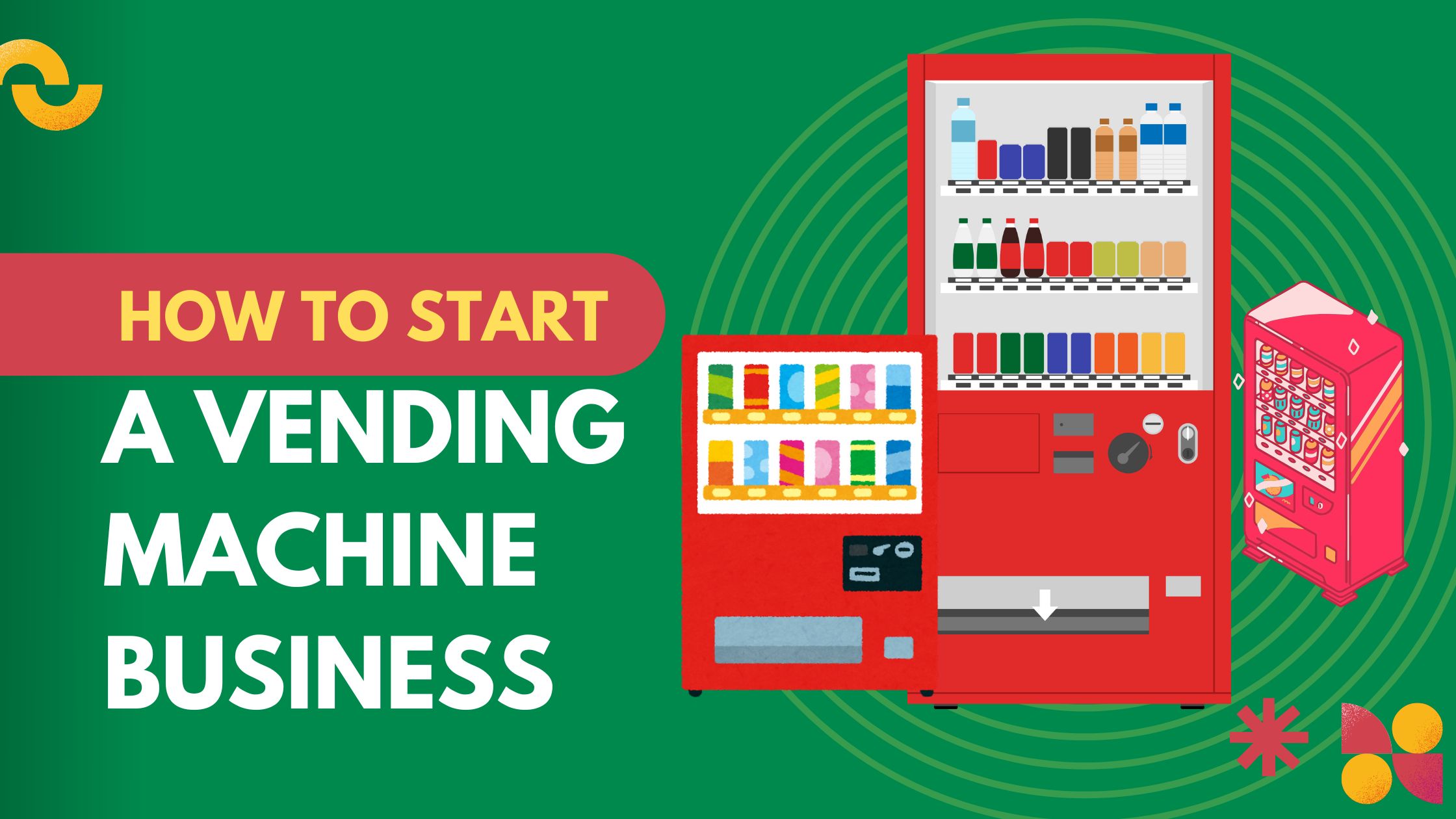
Ever thought about making money while you sleep? A vending machine business can do just that! It’s one of the easiest ways to earn passive income, requiring minimal effort once it’s set up. Whether you’re looking for a profitable side hustle or a full-time venture, vending machines offer flexibility, scalability, and a steady income stream.
The best part? You don’t need a huge investment to get started. With the right strategy, you can place machines in high-traffic locations, stock them with popular products, and watch the profits roll in. This guide will walk you through everything— from choosing the right machine to finding the best locations and scaling your business.
Let’s dive into the world of vending machines and discover How to Start a Vending Machine Business that thrives!
1. Why a Vending Machine Business is a Smart Choice
If you’re looking for a business that’s low-maintenance, scalable, and profitable, starting a vending machine business is a fantastic option. Unlike traditional businesses, vending machines don’t require full-time supervision. Once set up, they work around the clock—earning money while you focus on other things.
But why is this business such a great choice? Let’s break it down.
1.1 Low Startup Costs with High Profit Potential
Compared to opening a brick-and-mortar store, vending machines have significantly lower startup costs. You don’t need to rent a storefront, hire employees, or invest in expensive marketing campaigns. A single machine can cost anywhere from $1,500 to $10,000, depending on the type and features. But once you place it in a high-traffic area, you can start seeing returns quickly.
1.2 Flexibility and Passive Income
One of the biggest advantages of running a vending machine business is the flexibility it offers. You can start small with just one or two machines and gradually expand. Unlike a traditional business that requires constant attention, vending machines only need occasional restocking and maintenance.
1.3 Growing Demand for Convenient, Cashless Purchases
Consumers today prioritize convenience. Whether it’s grabbing a quick snack at work or buying a cold drink at the gym, vending machines provide instant access to products without the need for human interaction. Plus, modern vending machines now accept cashless payments, making it easier for customers to buy on the go.
1.4 Is a Vending Machine Business Right for You?
Still unsure if this is the right business for you? Here’s a simple comparison of the pros and cons to help you decide:
| Pros | Cons |
|---|---|
| Low startup costs | Finding profitable locations can be competitive |
| Flexible—work on your schedule | Machines need regular maintenance |
| Scalable—start small and grow | Vandalism and theft risks in some areas |
| Minimal ongoing expenses | Initial investment required |
| Passive income potential | Some locations may have slow sales |
If you’re looking for a low-risk business with high earning potential, starting a vending machine business could be your perfect match. The key is choosing the right locations and stocking the best products—both of which we’ll cover in the next sections.
2. Understanding the Vending Machine Market
Before jumping into the vending machine business, it’s essential to understand the market. Choosing the right products, identifying high-demand locations, and being aware of the competition can make the difference between success and failure. Let’s break it down.
2.1 Identifying Popular Product Trends
Not all vending machines sell the same items. While snacks and drinks are the most common, there’s a growing demand for specialty vending machines that offer healthier options, tech gadgets, or even beauty products. Here are some popular categories:
- Traditional Snacks & Beverages: Chips, sodas, bottled water, and candy bars.
- Healthy Vending: Protein bars, nuts, dried fruit, sugar-free drinks.
- Office & School Supplies: Pens, notebooks, USB drives.
- Tech & Accessories: Charging cables, earbuds, power banks.
- Personal Care Products: Face masks, sanitizers, cosmetics.
Understanding which products sell best in different locations will help you maximize profits. A vending machine in a gym might do well with protein bars and sports drinks, while one in a college campus could profit from energy drinks and snacks.
2.2 Researching Demand and Location Suitability
Location is everything in this business. You want to place your machines where people are likely to make impulse purchases. High-foot-traffic areas generally perform the best. Here are some top locations:
- Office buildings & coworking spaces – Employees want quick snacks and coffee.
- Hospitals & medical centers – Visitors and staff need convenient food and drinks.
- Apartment complexes – Residents appreciate late-night snack options.
- Gyms & fitness centers – Health-conscious buyers prefer protein-packed snacks.
- Airports, bus, & train stations – Travelers often need food and drinks on the go.
A key tip? Visit your target location at different times of the day. See how busy it gets and whether there’s already a vending machine. If there is, observe how often people use it—this can tell you whether it’s a good spot.
2.3 Evaluating Competition in Your Area
Just because an area has high foot traffic doesn’t mean it’s the right place for your vending machine. If there are too many vending machines already, your profits might be limited. Here’s how to evaluate the competition:
- Check existing vending machines – What products do they sell? Are they well-stocked?
- Look for gaps in the market – If most machines sell sodas and candy, consider offering healthier snacks or unique products.
- Consider pricing – Are your competitors overcharging? You can attract more customers with competitive prices.
2.4 Legal Requirements, Licenses, and Permits
Like any business, vending machines come with legal requirements. The rules vary by state and city, so it’s essential to check your local regulations. Common requirements include:
- Business licenses – Required for operating any vending business.
- Sales tax permits – You may need to collect and report sales tax.
- Health permits – If selling food, some locations require health inspections.
- Contracts with property owners – Many locations charge rent or commission for machine placement.
Checking with local authorities can help you avoid legal issues down the road. If you’re unsure where to start, a quick search for local business regulations or consulting with a business formal advisor can be helpful.
3. Creating a Solid Business Plan
A successful vending machine business starts with a well-thought-out plan. A business plan helps you stay focused, estimate costs, and set realistic goals. Whether you’re starting with one machine or planning to build a vending empire, this step is crucial.
3.1 Defining Your Business Goals
Before investing, ask yourself:
- Are you looking for a side hustle or a full-time business?
- Do you want to focus on snack vending, specialty items, or a mix of both?
- How many machines do you plan to start with, and how fast do you want to scale?
Setting clear objectives will help guide your decisions, from machine selection to pricing strategies.
3.2 Estimating Startup Costs and Expenses
Starting a vending machine business comes with initial costs and ongoing expenses. Here’s what you should budget for:
| Expense Category | Estimated Cost |
|---|---|
| Vending Machine Purchase | $1,500 – $10,000 per machine |
| Initial Product Inventory | $200 – $1,000 |
| Location Fees / Rent | $50 – $300 per month (varies) |
| Maintenance & Repairs | $50 – $200 per month |
| Payment System (Cashless/Card Readers) | $250 – $500 per machine |
| Business Licenses & Permits | $50 – $500 |
| Insurance | $300 – $1,000 per year |
These numbers can vary depending on the machine type, location, and business model. Planning your finances early prevents unexpected costs from eating into your profits.
3.3 Choosing a Business Structure
Your business structure affects taxes, legal responsibilities, and growth potential. Here are the most common options:
- Sole Proprietorship – Simple and low-cost, but you’re personally responsible for liabilities.
- LLC (Limited Liability Company) – Protects your personal assets, ideal for small businesses.
- Corporation – Best for large-scale operations, but requires more paperwork.
If you’re unsure which structure fits best, consulting a professional can help. Plus, registering your business with the Better Business Bureau complaint system can enhance your credibility with customers and partners.
3.4 Projecting Profits and Break-Even Timeline
How long will it take to recoup your investment? This depends on machine placement, product selection, and pricing. Here’s an example of potential earnings:
- Daily Sales Per Machine: 20-50 items
- Average Profit Per Sale: $0.50 – $2.00
- Monthly Revenue (Per Machine): $300 – $1,500
- Estimated Break-Even Timeline: 6-12 months
By tracking your revenue and expenses, you can adjust pricing, relocate machines, or try new product mixes to maximize profits.
4. Choosing the Right Vending Machine
Not all vending machines are created equal. The type of machine you choose will determine your initial investment, maintenance requirements, and the kind of products you can sell. Let’s explore your options to help you make the best decision for your vending machine business.
4.1 Types of Vending Machines
There are several types of vending machines, each designed for specific products and locations. Here’s a breakdown of the most common options:
| Vending Machine Type | Best For | Pros | Cons |
|---|---|---|---|
| Snack Machines | Chips, candy, protein bars | High demand, easy to restock | Limited to packaged food items |
| Drink Machines | Sodas, bottled water, juices | Steady sales, especially in hot climates | Some require refrigeration |
| Combo Machines | Snacks & drinks | Versatile, saves space | Higher upfront cost |
| Healthy Vending Machines | Organic snacks, sugar-free drinks | Growing demand for healthy options | Products can be more expensive |
| Specialty Machines | Tech accessories, beauty products, office supplies | Unique and less competition | Niche market, needs research |
When selecting a machine, consider your target audience and location. For example, a gym would benefit from a healthy vending machine, while a busy office might need a combo machine with snacks and coffee.
4.2 New vs. Used Machines: Which One Should You Buy?
One major decision is whether to buy a brand-new or used vending machine. Both have pros and cons:
- New Machines: Come with warranties, modern technology, and cashless payment options, but they cost more.
- Used Machines: Cheaper upfront, but may require repairs and might not have the latest features.
If you’re on a tight budget, starting with a used machine can be a smart move. However, make sure to inspect it thoroughly or buy from a reputable seller to avoid frequent breakdowns.
4.3 Important Features to Look For
Technology is rapidly changing the vending machine industry. To stay competitive, consider machines with:
- Cashless Payment Systems – Accepts credit/debit cards, mobile payments, and even contactless options like Apple Pay.
- Remote Monitoring – Lets you track sales and stock levels from your phone.
- Energy Efficiency – Machines with LED lighting and energy-saving modes help cut electricity costs.
- Custom Branding – Allows you to display logos and promotions to attract customers.
4.4 Where to Buy Vending Machines
Once you decide on the type of machine you need, the next step is finding a reliable supplier. Some options include:
- Direct from manufacturers (e.g., Seaga, AMS, or Crane) – Best for buying new machines with warranties.
- Online marketplaces (eBay, Craigslist, Facebook Marketplace) – Good for finding used machines at lower prices.
- Local vending machine suppliers – Offer refurbished machines with potential maintenance support.
- Business storage auctions – Sometimes businesses sell off old machines at discounted rates.
Choosing the right machine sets the foundation for a profitable vending business. The next step? Finding the perfect location to place it.
5. Finding the Best Locations for Your Vending Machines
The success of your vending machine business depends heavily on where you place your machines. Even the best machine with top-selling products will struggle if it’s in a low-traffic area. Here’s how to find and secure the best locations.
5.1 What Makes a Great Vending Machine Location?
A good location isn’t just about foot traffic—it’s about the right kind of foot traffic. The best locations have:
- High daily foot traffic – More people passing by means more potential customers.
- A captive audience – Places where people wait or spend time, like offices, schools, and laundromats.
- A specific demand for vending – Locations without convenient snack or drink options.
5.2 Top Locations for Vending Machines
To maximize profits, consider placing your machines in these high-traffic areas:
| Location | Why It Works | Best Products to Sell |
|---|---|---|
| Office Buildings | Employees need quick snacks & drinks | Coffee, energy drinks, protein bars |
| Gyms & Fitness Centers | Health-conscious customers | Protein shakes, water, healthy snacks |
| Schools & Colleges | Students love convenience | Chips, energy drinks, school supplies |
| Hospitals & Clinics | Visitors and staff need easy food options | Bottled water, granola bars, coffee |
| Airports, Bus & Train Stations | Travelers need snacks on the go | Sandwiches, soda, gum |
| Apartment Complexes | Residents need 24/7 access to snacks | Soda, chips, frozen meals |
If possible, visit potential locations before making a decision. Look for vending machines already there and see how often people use them. If a machine is empty or frequently used, that’s a good sign it’s a profitable spot.
5.3 How to Secure a Vending Machine Location
Once you find a good location, the next step is getting permission to place your machine. Here’s how to do it:
- Contact the Property Owner or Manager – Reach out to businesses, building managers, or property owners. A well-written proposal helps.
- Negotiate a Deal – Many locations charge a small monthly rent or a commission on sales (usually 10%-25%).
- Sign a Placement Agreement – Always get written permission to avoid future issues. The agreement should outline rent, maintenance responsibilities, and contract length.
Some business owners may hesitate, but highlighting the benefits can help:
- No work required on their end—you handle everything.
- It provides convenience for employees, customers, or visitors.
- They get a share of the profits without any effort.
5.4 Should You Consider Route Services to Start a Vending Machine Business?
If negotiating locations feels overwhelming, you can buy into a vending machine route—where someone else has already secured locations. While this is an easier way to start, be cautious. Some routes are overpriced or placed in low-traffic areas. Always check sales records before purchasing a vending route.
6. Stocking and Maintaining Your Vending Machines
Once your vending machine business is up and running, keeping your machines well-stocked and properly maintained is key to maximizing profits. A poorly stocked or frequently broken machine will frustrate customers and hurt sales. Let’s go over how to manage your inventory and keep your machines running smoothly.
6.1 Choosing the Right Products
The best-selling vending machine products depend on location and customer preferences. Here are some popular categories to consider:
| Product Category | Best-Selling Items | Best Locations |
|---|---|---|
| Snacks | Chips, candy bars, granola bars | Schools, offices, break rooms |
| Drinks | Bottled water, soda, energy drinks | Gyms, offices, transit stations |
| Healthy Options | Trail mix, protein bars, fruit snacks | Gyms, hospitals, corporate offices |
| Specialty Items | Phone chargers, earbuds, face masks | Airports, hotels, malls |
Pay attention to customer demand and be ready to swap out slow-moving products. If certain items aren’t selling, replace them with something new.
6.2 How to Price Your Products for Profit
Pricing should be competitive while ensuring a solid profit margin. A good rule of thumb is to mark up products 100% – 200% above wholesale cost. For example:
- If a soda costs $0.50 wholesale, sell it for $1.25 – $1.50.
- If a candy bar costs $0.75 wholesale, price it at $1.50 – $2.00.
Be sure to check local competitors and adjust pricing accordingly. If your vending machine is in a premium location (like an airport or hospital), customers may be willing to pay slightly higher prices.
6.3 Tracking Inventory and Restocking Efficiently
Managing inventory is crucial to prevent stockouts and reduce waste. Here’s how to stay organized:
- Use Remote Monitoring (if available) – Some modern vending machines have software that tracks sales and stock levels in real time.
- Keep a Restocking Schedule – Depending on demand, check machines weekly or biweekly to refill products.
- Rotate Expiring Items – Place newer products in the back and move older ones forward to prevent waste.
- Analyze Sales Data – Track best-sellers and slow-moving items to optimize your inventory.
6.4 Routine Maintenance to Keep Machines Running
A broken vending machine means lost sales and unhappy customers. Here’s how to avoid downtime:
- Clean the Machine Regularly – Wipe down the keypad, glass, and payment system to keep it looking professional.
- Check for Coin and Bill Jams – Customers may stop using your machine if it frequently eats money.
- Test Card Readers and Cashless Payment Systems – Ensure all payment methods work to avoid lost sales.
- Perform Preventive Maintenance – Lubricate moving parts and check for worn-out motors or belts.
6.5 Handling Repairs and Customer Complaints
No matter how well you maintain your machines, occasional breakdowns happen. Be prepared to handle issues quickly:
- Have Spare Parts on Hand – Common replacements include bill validators, motors, and coin mechanisms.
- Know a Reliable Technician – If you’re not comfortable fixing machines yourself, have a vending repair service on call.
- Address Customer Issues Promptly – A visible phone number or QR code on your machine allows customers to report issues. Being responsive helps maintain trust.
For customer concerns, consider registering with the Better Business Bureau complaint system to show you’re a responsible business owner.
7. Marketing and Expanding Your Vending Machine Business
Once your vending machine business is running smoothly, it’s time to think about growth. Marketing might not seem like a priority in vending, but the right strategies can help you increase sales, secure better locations, and expand your business.
7.1 How to Market Your Vending Machine Business
Even though vending machines rely on foot traffic, a little marketing effort can boost visibility and sales. Here’s how:
- Optimize Your Machine’s Appearance – A clean, well-lit, and well-stocked machine attracts more customers. Consider adding custom branding with your logo and contact info.
- Offer Promotions and Discounts – Digital vending machines can run promotions like “Buy 2, Get 1 Free” to encourage bulk purchases.
- Partner with Businesses – Offer property owners a higher revenue share in exchange for placing more machines at their locations.
- Leverage Social Media – Post updates about new locations, product restocks, or promotions to engage local customers.
- Use Signage and QR Codes – Place small signs near the machine advertising cashless payment options or rewards programs.
7.2 When and How to Expand Your Vending Machine Business
Once your first few machines are turning a profit, scaling up is the next step. Here’s how to do it smartly:
- Analyze Your Sales Data – Identify which locations and products are performing best to replicate that success in new areas.
- Reinvest Profits into More Machines – Start small, then expand strategically based on demand.
- Diversify Your Machine Types – Consider adding healthy vending machines, coffee vending machines, or specialty vending for new income streams.
- Expand to New Territories – Look at neighboring cities or high-traffic locations where vending options are limited.
- Consider Hiring Help – As you grow, hiring someone to handle restocking and maintenance can free up your time for expansion.
7.3 Franchising vs. Independent Growth
If you want to expand quickly, you have two main options:
- Buying a Vending Franchise – A vending franchise provides machines, locations, and training, but comes with fees and less control over business decisions.
- Growing Independently – This route takes more effort but allows you to control costs, choose locations, and maximize profits without franchise fees.
7.4 Managing a Larger Vending Operation
As you scale, keeping track of inventory, locations, and revenue becomes more complex. Consider:
- Using Vending Management Software – Tools like Nayax or VendSoft track sales, restocking needs, and machine health remotely.
- Upgrading to Smart Vending Machines – Cashless payment systems and real-time monitoring help streamline operations.
- Investing in Business Storage – If you’re managing multiple machines, renting a business storage unit helps keep extra inventory and spare parts organized.
8. Legal and Financial Considerations for Start a Vending Machine Business
Running a vending machine business isn’t just about stocking snacks and collecting cash—it also involves legal and financial responsibilities. From permits to taxes, understanding these aspects will help you avoid legal trouble and keep your business profitable.
8.1 Registering Your Vending Machine Business
Before placing your first machine, you’ll need to register your business properly. The exact requirements vary by state and city, but here are the common steps:
- Choose a Business Structure – Most vending operators start as a sole proprietorship or LLC. An LLC provides liability protection, which is useful if any legal issues arise.
- Register with State and Local Authorities – You may need a business license or vending permit to operate legally.
- Obtain a Tax ID (EIN) – If you plan to hire employees or operate under a business name, you’ll need an Employer Identification Number (EIN) from the IRS.
- Check Zoning and Location Regulations – Some cities have restrictions on vending machines in public areas or near schools. Always verify local regulations.
8.2 Understanding Vending Machine Taxes
Your vending machine business will be responsible for collecting and paying taxes. Here’s what to keep in mind:
- Sales Tax – Most states require vending machine sales to be taxed. You’ll need to apply for a sales tax permit and remit taxes regularly.
- Income Tax – Report your vending profits on your annual tax return. If you’re structured as an LLC, you may have additional tax benefits.
- Payroll Taxes (If Hiring Employees) – If you expand your business and hire staff, you’ll need to withhold payroll taxes and comply with labor laws.
To simplify tax management, consider using accounting software like QuickBooks or hiring an accountant.
8.3 Insurance for Your Vending Business
Insurance isn’t mandatory, but it protects your business from unexpected events. The most useful types of coverage include:
- General Liability Insurance – Covers property damage or customer injuries (e.g., if a vending machine tips over).
- Business Property Insurance – Protects machines from theft, vandalism, or damage.
- Workers’ Compensation Insurance – Required if you hire employees.
If a better business bureau complaint is ever filed against you, having proper legal and financial safeguards in place can help resolve disputes professionally.
8.4 Managing Your Finances for Long-Term Success
Good financial management is essential to keeping your vending business profitable. Follow these tips:
- Separate Business and Personal Finances – Open a business bank account to track revenue and expenses.
- Monitor Your Cash Flow – Keep detailed records of machine sales, restocking costs, and profits.
- Plan for Expansion – Reinvest earnings into new machines and high-traffic locations to grow your business.
- Reduce Unnecessary Expenses – Avoid overstocking slow-selling products or paying too much for machine placement fees.
10- Final Thoughts on Starting a Vending Machine Business
Starting a vending machine business can be a profitable and flexible way to generate income, but success doesn’t happen overnight. By choosing the right locations, stocking in-demand products, maintaining your machines, and handling the legal and financial aspects properly, you’ll set yourself up for long-term success.
10.1 Key Takeaways for Success
Before you start placing machines, keep these essential tips in mind:
- Start Small, Then Scale Up – Test the waters with one or two machines before committing to a larger operation.
- Location Is Everything – High-traffic areas like office buildings, schools, and shopping centers yield the best returns.
- Stock Smartly – Pay attention to what sells best and adjust your inventory accordingly.
- Maintain and Monitor Your Machines – Routine cleaning, restocking, and repairs keep customers happy and revenue flowing.
- Stay on Top of Legal and Financial Responsibilities – Register your business, track income, and handle taxes correctly to avoid legal trouble.
10.2 Is a Vending Machine Business Right for You?
If you’re looking for a low-maintenance business with flexible hours, vending could be a great opportunity. It doesn’t require a huge upfront investment, and with the right strategy, it can generate steady passive income. However, like any business, it demands dedication, smart decision-making, and constant optimization.
10.3 Taking the First Step
Now that you know how to start a vending machine business, the next step is to take action:
✅ Research vending machine suppliers and costs
✅ Scout potential locations and negotiate placement deals
✅ Register your business and secure any necessary permits
✅ Invest in quality machines and stock them with top-selling products
✅ Monitor performance and expand strategically
With careful planning and effort, your vending machine business can grow into a reliable source of income. So why wait? Get started today and take the first step toward vending success!
FAQs – Answers to Common Questions On How to Start a Vending Machine Business?
FAQ1. Can I run a vending machine business part-time?
Yes, a vending machine business is a great option for part-time entrepreneurs. Once the initial setup is done, managing your machines requires minimal time. You can check and restock machines during your free hours, making it an ideal side hustle.
FAQ2. How can I accept cashless payments with my vending machines?
To cater to today’s tech-savvy customers, you can equip your machines with cashless payment options like credit cards, mobile payments (Apple Pay, Google Pay), and contactless cards. This increases convenience and sales, especially in high-traffic areas where people are less likely to carry cash.
FAQ3. How do I handle machine malfunctions and repairs?
Regular maintenance is crucial to keeping your vending business running smoothly. It’s a good idea to either learn how to troubleshoot simple issues or hire a technician who can quickly address malfunctions and ensure your machines are always operational.
FAQ4. What are the best vending machine types for first-time owners?
For beginners, it’s advisable to start with basic snack or drink vending machines that are easy to manage and relatively inexpensive. As you grow, you can look into specialty machines like fresh food dispensers or coffee machines, which might require more investment but can be highly profitable in the right locations.
FAQ5. How do I deal with theft or vandalism in my vending machines?
To prevent theft or vandalism, it’s important to place your vending machines in well-lit, high-traffic areas that are monitored by security cameras. Additionally, installing machines with reinforced locks and using remote monitoring systems can help you track activity and minimize the risk of damage or loss.
Conclusion: How to Start a Vending Machine Business?
Starting a vending machine business is a fantastic way to earn passive income with minimal daily involvement. While it may seem as simple as placing a machine and collecting cash, success requires smart planning, strategic location choices, and ongoing maintenance. By carefully selecting high-traffic locations, stocking the right products, and staying on top of legal and financial responsibilities, you can build a profitable and scalable business.
Whether you’re looking for a side hustle or a full-time venture, vending offers flexibility, growth potential, and steady earnings. The key is to start small, learn from experience, and expand strategically. With the right approach, your vending business can become a sustainable source of income for years to come.
So, are you ready to take the first step? There’s no better time to dive into the world of vending and turn your entrepreneurial dreams into reality! 🚀































